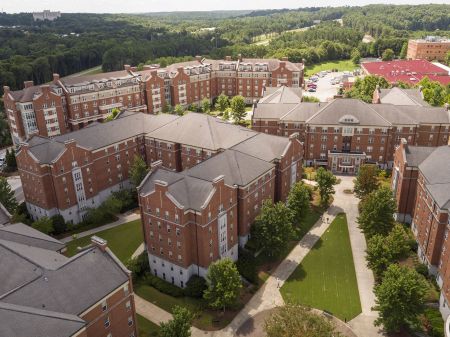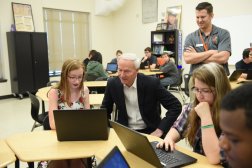Computer science, STEM topic of discussion at RNC

While Republicans and Democrats remain divided on most issues, the push for computer science and STEM education in America continues to garner bipartisan support.
Elected officials on national, state and local levels generally agree, science, technology, engineering and math education, along with computer science instruction, lead to promising careers. Officials are quick to add, they want kids in the U.S. to have an upper hand in the growing tech industry.
“Technology has become an essential tool of learning, it must be a key element in our efforts to provide every child equal access and opportunity,” according to this year’s Republican platform document released on the eve of the convention. Democrats, who issued their platform draft this week, are also expected to touch on STEM education at their convention next week, according to sources who follow education issues.
Arkansas Gov. Asa Hutchinson, on Thursday, speaking at a public education policy discussion held at the Republican National Convention in Cleveland, was among those who reinforced the importance of computer science and STEM instruction in the classroom.
“Teachers are the key ingredient for this. We’ve got to put more funding and resources to pay our STEM and computer science teachers more, to keep them from going into the private sector,” he said. The discussion, “The Workforce of the Future: A Policy Discussion on STEM and Computer Science Education,” was hosted by Microsoft and The Hill, a political website. A similar discussion is scheduled for the Democratic National Convention in Philadelphia next week.
Hutchison has been a leader in promoting computer science initiatives. Arkansas is the first state to mandate all high schools to offer computer science courses that count as a graduation requirement. Arkansas has allocated millions to provide teachers with adequate professional development. Hutchinson says he believes teachers are the driving force behind STEM education.
Others spoke about what they’re doing to give students, particularly minority and female kids, a shot at computer science.
Lauren Holloway, a software development instructor at We Can Code IT, a coding bootcamp, shared the story of a teen mother who used the skills she gained from their program to land a highly paying job.
Feowyn MacKinnon, head of school at the MC2 STEM High School in Cleveland shared the story of a student, named David Boone, who studied diligently to go from homeless to Harvard, and landed a job at Microsoft, by taking his STEM education seriously.
The speakers unanimously agreed that they want to see STEM and computer science become a more prevalent, actionable concern of elected officials.
“Collaboration is key if you really want to solve this program,” Holloway said. “It’s not a partisan issue – it doesn’t matter where you are or who you are – we’re all being effected by it. I ask for our politicians to create connections between corporations, government agencies and our educational system to solve this problem together.”
“Promoting education is a big priority so it was important to support that bipartisan conversation about policies at this year’s conventions,” Christina Pearson, senior director of public relations at Microsoft, wrote to EdScoop in an email. “Microsoft has been active for several years promoting greater access to computer science education because we think it is vitally important to promote jobs, grow the economy and advance new innovations in technology,“ she added.
Reach the reporter at darlene.aderoju@edscoop.com and follow her on Twitter @buuukky and @edscoop_news.




